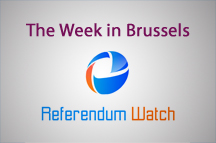 Am I alone in finding it difficult to get enthused about the forthcoming referendum? As a Brussels based public affairs consultant you’d think my livelihood was at stake and I’d be desperate to see the UK stay in. Well, honestly, on a personal and professional level, I’m not really bothered.
Am I alone in finding it difficult to get enthused about the forthcoming referendum? As a Brussels based public affairs consultant you’d think my livelihood was at stake and I’d be desperate to see the UK stay in. Well, honestly, on a personal and professional level, I’m not really bothered.
The UK government has no intention of cutting its ties with the European Union, no matter the result of the EU Referendum. The clue is in the question contained in the EU Referendum Bill 2015 now amended on the advice of the Electoral Commission:
“Should the United Kingdom remain a member of the European Union or leave the European Union?”
Either a Remain or Leave to that question could simply deliver the status quo. Remain allows the UK to continue acting like a bored teenager on some awful camping holiday; Leave would require the UK to trigger Article 50 of the EU Treaty and “withdraw from the Union in accordance with its own constitutional requirements."
But what if the very nature of the UK’s relationship with the EU changed so significantly in 2011, that a two-tier EU already exists, making Remain or Leave votes largely cosmetic.
 It is hard to consider any other reasoning given the lack of attention being paid in Whitehall to the implications of a Leave vote. As witnessed in Scotland, despite the full resources deployed by the British state, a well-organised popular movement for change can make the eventual result too close to call. The risk of a Leave vote is real. The levels of complacency are therefore surprising.
It is hard to consider any other reasoning given the lack of attention being paid in Whitehall to the implications of a Leave vote. As witnessed in Scotland, despite the full resources deployed by the British state, a well-organised popular movement for change can make the eventual result too close to call. The risk of a Leave vote is real. The levels of complacency are therefore surprising.
So what to make of the absence of any serious consideration of the alternative arrangements? There are no stakeholder consultations, no big think tank reports, no detailed ministerial speeches or government White Paper examining what kind of trading relationship the UK might occupy outside of the EU. It is simply unthinkable that any British government would knowingly embark upon such a profound change to the country’s status without more thorough preparations.
That leads me to assume that a Leave vote would not take the UK out of the Single Market, nor would it even take the UK into a Norway or Switzerland style membership. The UK could cease to be a member of the European Union, but remain signed up to the four freedoms, with full voting rights, participation in the EU Institutions, and paying the same annual budgetary contribution. They would just need to change the name. Maybe EU-zero or something.
Jean-Claude Juncker gave the game away following his Chequers dinner, letting it be known that the Referendum was a mechanism to “dock” the UK into Europe for good. That was a mixture of mischief making (Juncker has little time or respect for Cameron) as well as a signal that a different label will need to be applied to the UK’s membership status.














